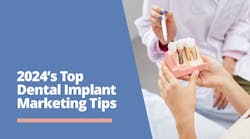Addressing the emotional challenges of tooth loss with implant therapy
Tooth loss affects a considerable proportion of the US population. Among adults over 65, a survey revealed that 12.9% were dealing with complete tooth loss.1 Older adults aren’t the only ones affected by tooth loss, either. In fact, another survey of US adults found that, on average, adults between 20 and 64 years of age had only 25.5 teeth out of 32 remaining.2
For many, dentures are the solution to the esthetic and emotional challenges of tooth loss. Dentures are used by nearly 41 million Americans, according to a 2020 survey.3 However, many emotional and functional challenges persist with conventional denture wear, and they are not always a permanent solution.4 Fortunately, innovative technologies are making it easier than ever for dentists to address and alleviate both the emotional and physical struggles of tooth loss.
Unseen challenges of tooth loss and denture wear
Many different factors can contribute to tooth loss, including chronic disease, smoking, and injury, but no matter what path led there, it is still detrimental to patients from a social, physical and esthetic standpoint.5
The standard treatment for tooth loss for centuries has been dentures, but those come with their own set of challenges. Traditional dentures can cause irritation, jawbone deterioration, and functionality issues, plus they can slip, making them difficult to keep in place. Additionally, the treatment path to receiving a set of conventional, nondigital dentures involves many, many visits, invasive impressions, and iteration after iteration until the dentures are just right–and even then, just right will only result in 10% of the functionality of natural teeth.6
Because of the limited functionality of traditional dentures, patients who wear them face social and emotional stigma. Being unable to socialize the way they want, eat the foods they want, and interact with the world in the way they want inarguably diminishes denture wearers’ quality of life.
Fortunately, we can do better for these patients.
Implant therapy alleviates the challenges of tooth loss
Dental implant therapies replicate natural dentition as closely as possible, allowing patients to live their lives on their terms. Even if a patient only receives two implants to support an overdenture, that still results in approximately 60% functionality of natural teeth. With four implants to support an overdenture, that functionality skyrockets to upwards of 90%, a far cry from the 10% functionality of traditional dentures.6
Digital dentistry techniques have revolutionized prosthetic treatment. By utilizing noninvasive scans instead of impressions, and incorporating 3D printing for functional try-ins, digital dentistry techniques ensure not only comfortable fittings, but also incredibly fast care.
Whether full dentures are the best treatment option or a patient is receiving implant-retained or implant-supported dentures, this digital approach both enhances clinical outcomes and significantly alleviates the emotional difficulties associated with tooth loss, leading to improved mental well-being for patients.
It’s never too late to change a patient’s life by providing optimal treatment. We treated a 101-year-old patient whose chief complaint was that she couldn’t wear dentures, which meant she couldn’t eat celery, one of her favorite foods. She wasn’t getting the enjoyment she craved out of her diet, so we provided implant therapy, and she was able to eat celery every day for the rest of her life.
Providing the optimal therapy to restore as much function as possible truly impacts patients’ lives.
Dentists play a crucial role in supporting patients experiencing tooth loss
As dentists, we need to be able to offer our patients the most up-to-date, contemporary care–and that means delivering dental implant therapy. We must be able to provide these services to patients, because it’s not good enough to tell a patient that the best we can offer them today is a conventional denture. That means we need to learn everything we can about implants and be able to talk about them confidently with patients. We need to be able to discuss the value of implants not only from a practical standpoint in terms of function, form, and esthetics, but also from an emotional standpoint.
For many patients, the major barrier to implant therapy is the financial commitment. However, most people today are willing to make investments in the things they value, whether that be a car, a vacation, or anything in between. We have an obligation to patients to clearly communicate the value of implant therapy so they can understand the importance of that investment and the benefits they can reap in terms of quality of life.
Commit to comprehensive dental care
It’s our responsibility as health-care providers to offer patients the most optimal care possible. When it comes to tooth replacement, there’s no question that implants or implant-supported dentures are the best way to rehabilitate patients dealing with tooth loss. Further, digital dentistry technologies and techniques can make implant therapy even more seamless and accessible.
Comprehensive dental care means caring for patients both clinically and emotionally. Providing a treatment plan that can improve both physical and mental health is a win-win.
Editor's note: This article originally appeared in DE Weekend, the newsletter that will elevate your Sunday mornings with practical and innovative practice management and clinical content from experts across the field. Subscribe here.
References
- Fleming E, Afful J, Griffin SO. Prevalence of tooth loss among older adults: United States, 2015-2018. CDC, National Center for Health Statistics. June 17, 2020. www.cdc.gov/nchs/products/databriefs/db368.htm
- Tooth loss in adults (age 20 to 64). National Institute of Dental and Craniofacial Research, US Department of Health and Human Services. July 2022. www.nidcr.nih.gov/research/data-statistics/tooth-loss/adults
- Kolen D. The latest in dentures. Academy of General Dentistry. September 12, 2022. https://www.agd.org/constituent/news/2022/09/12/the-latest-in-dentures
- Hidden challenges of tooth loss and dentures revealed in new study. Br Dent J 236, 940–941 (2024). https://doi.org/10.1038/s41415-024-7587-1
- Tien J. Tooth loss truth: it’s no longer about the tooth fairy. Harvard Health. August 27, 2021, www.health.harvard.edu/blog/tooth-loss-truth-its-no-longer-about-the-tooth-fairy-202108252578
- Full arch rehabilitation: all-on-4 restorative steps roadmap for success. Accessed August 12, 2024. https://link.edgepilot.com/s/d04d0259/fDYGBgrL_ESEIf8L83Nv5A?u=https://iddentallab.com/wp-content/uploads/2017/02/Nobel-Biocare-All-on-4-Restorative-Steps-Roadmap.pdf
About the Author

Sundeep Rawal, DMD
Sundeep Rawal, DMD, is senior vice president, Implant Support Services, for Aspen Dental Management. In his role, he provides leadership and support for doctors on implant restoration, treatment planning, and case presentation. Dr. Rawal cofounded the Digital Dentistry Institute and was previously a private practice prosthodontist at Florida Prosthodontics, PA. He completed his dentistry training at the University of Florida College of Dentistry and his prosthodontics training at the University of California San Francisco.


